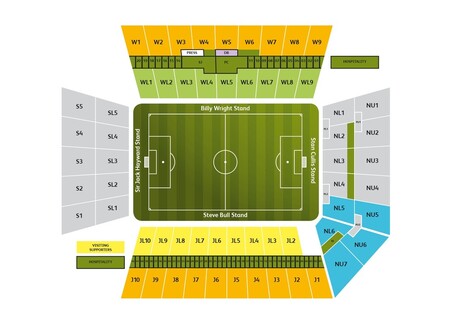Home advantage in sport has received considerable attention in both the economics and psychology literature. Playing at home is advantageous for teams as it is a familiar environment for players, requires shorter travel and often contains a partisan groups of supporters.
Previously, Nevill, Balmer & Williams (2002) have found that crowd noise effects refereeing decisions, with home teams awarded significantly more free-kick than away teams. Garicano, Palacios-Huerta and Prendergast (2005) report referees often favour home teams, in order to satisfy the crowds in the stadium, by shortening close games where the home team is ahead, and lengthening close games where the home team is behind. In fact, stadiums where supporters are located further from the field of play, for example due to the presence of a running track, are more likely to witness more impartial refereeing decisions. Spectators simply can't influence referees in the same way.
The English Premier League (EPL) is a nice place to consider this. One of the many great things about the EPL is the substantial presence of away fans at games. If one watches other European leagues, particularly La Liga, away fans are barely noticeable. For example, when Barcelona travel to Madrid to play great rivals Real, a scattering of fans can be seen in the upper tier of the Bernabeu when they score. The same is true of Real fans at the Camp Nou.
Away fans in the EPL normally get access to 3,000 tickets per game, or 10% of stadium capacity if greater than 30,000 seats. In 2017/18 the EPL introduced rule changes to further encourage away fan attendance. This was on a back of a three-year cap on away fan ticket prices at £30. According to the EPL, the 2017 changes included a commitment that would see "away supporters...seated together at all stadiums and at least one block of away fan seats...made available pitch side". This is important as it moved away fans closer to the field on play.
Four clubs at the time were earmarked for change: Sunderland, Newcastle, Manchester United and Tottenham. I often thought it a masterstroke from Manchester United to place fans in the upper tier of the stadium by the corner flag. The Old Trafford club have subsequently had to change, as have Sunderland. Tottenham moved stadium but have since now allocated away fans lower tier seats in the new Tottenham Hotspur Stadium. Newcastle remain the only club to place fans in the 'gods'. The Tyneside clubs are permitted to do so on health and safety grounds, meaning away fans are a long way from their heroes at St. James Park.

Aside from having an excellent view of the game - lower tier side-line tickets are usually the most sought after - fans are grouped together for the entirety of the side-line. This means a group of supporters will at all times be directly adjacent to the assistant referee. Such placement cannot be in the interest of the home team. As assistant referees normally run on the half of the pitch closest to each left-back, clubs often place away fans near the right-back position so as to maximise the distance between them and each assistant referee.
From observation, I believe Aston Villa, Norwich and Crystal Place place away fans beside the left-back position. Wolves are even more accommodating to away spectators. Whether or not this matters is open to debate but most other clubs in the Premier League seem to take a different approach, and none offer an entire lower tier of a side-line stand to the away support.
 RSS Feed
RSS Feed